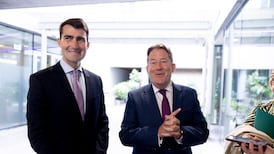"Revolutionary" is how a spokesman for the European Consumer Affairs Commissioner, Mr David Byrne, describes the proposed EU legislation on air passenger protection.
And revolutionary it might be if the EU succeeds in getting airlines and airports to beef up passengers' rights through a twin approach of legislation and an improved voluntary code of practice.
For passengers too familiar with tales of delayed and overbooked flights, missing baggage and too little assistance when things do go wrong, any improvement would be welcome.
One of the key areas the EU is tackling is putting some backbone into the law relating to the contract between the passenger and the airline.
"The proposals provide for a minimum floor of consumer rights, which will be legally enforceable. It's an area where David Byrne feels it's necessary to legislate because the whole voluntary-type system hasn't worked and won't work in our view," said a spokesman for Mr Byrne.
"All the bigger airlines are broadly positive at the direction we're taking; they recognise it needs to be done," he said.
Many of the issues raised had been implemented already by Aer Lingus according to a spokesman.
"In a general sense, we would be very supportive of anything that makes the relationship between the customer and Aer Lingus better," he said.
Ryanair too has reacted positively to the suggested strategy. Mr Michael O'Leary, chief executive, says his company was very keen to encourage the implementation of the proposed legislation. "We think it would be good for our business and would reward airlines on their on-time performance."
More people are travelling by air than ever and at prices unimagined a few years ago. But as the popularity of air travel has increased, so has dissatisfaction.
This is the area being addressed in the new proposals which should become law at the October meeting of the EU Council of Transport Ministers. They have been drawn up by Mr Byrne and Ms Loyola de Palacio, the vice-president of the European Commission with responsibility for transport.
Apart from the proposals for change the Commission is also actively looking to let people know what their rights are.
A spokesman for the Irish Travel Agents Association says it would welcome any legislation that would benefit the travelling consumer.
The Commission says it is aware of the danger that overregulation could raise costs, lessen scope for competition and hamper the co-operation between airlines that facilitates international travel. It says it wants to strike the right balance between legislation and voluntary agreements.
It believes stronger protection of passengers will encourage airlines to offer a better service. In the proposals now with the Council of Ministers, it is anticipated that EU legislation would oblige airlines to draft a contract that clearly states the rights and obligations of both parties, including the fare, additional fees, charges and taxes, the total to be paid, the status of the ticket, conditions for refunds, the identity of the operating carrier and to inform the passenger of these things before the ticket is booked. The airline should also specify the conditions of carriage.
The Commission sees no reason why airlines should be allowed to change the price fixed.
On code-sharing - where the ticket carries the code of the airline with which the passenger makes a contract while another airline operates the flight - legislation should make the contracting airline specify the carrier actually operating the flight. And the passenger must know the exact conditions applicable to the ticket.
Strong legislation is planned to deal with the situation where passengers are denied boarding because of overbooking. Minimum care, in the form of free telephone calls, meals, refreshments and hotel accommodation is proposed in this situation because the airline is always responsible for over-booking, but not for delays.
On delays, the Commission considers it unacceptable for passengers to be left stranded for hours when airlines have undertaken to use their best efforts to carry them "with reasonable dispatch" and have accepted their money. But for passengers delayed before check-in, the Commission says responsibility lies with the airport concerned.
Another area of concern to the Commission is the requirement for passengers to confirm and reconfirm bookings for which they have already paid. It sees this as an imposition on travellers.
On health issues and the conditions in aircraft cabins, the Commission notes the warnings from some experts about the effects of low pressure, seat pitch and of cosmic radiation and about the risk of transmission of disease. An expert group will scrutinise existing research and further studies should be undertaken if necessary. It also will explore whether union-wide measures could be taken to deal with air rage.
The Amsterdam treaty commits the EU to combating discrimination against disabled people. The Commission believes that, while airlines and airports are better than other areas of transport in their treatment of disabled people, their services vary in quality. Disabled people must be able to count on similar treatment in order to plan their journeys and avoid unpleasant surprises.
The Commission proposes an overall policy based not just on EU legislation but on the voluntary commitments of airlines and airports to raise service quality, to improve information and to take greater note of their representations - in short, to put the situation in Europe on a par with the United States.
On a voluntary level, the Commission argues the airlines should undertake:
to offer the lowest fare available at the time;
allow reservations to be held or cancelled, without penalty, for 24 hours;
provide up-to-date information for passengers;
provide adequate care for passengers delayed in airports or on aircraft;
institute higher limits on liability for luggage lost, assistance on lost baggage and delivery within a given time.
The Commission thinks that under a voluntary code, airlines should commit themselves to adopting standardised procedures for lodging complaints, creating effective systems for dealing with them and responding in a short time.
In cases where both sides disagree, a settlement system based on its recommendations for out of court settlement on consumer disputes is suggested.
The Aer Lingus spokesman said the firm already met the obligation on the reservations department to quote the lowest fare and processes for lodging complaints (cards are on board every aircraft). While it did not have a customer charter, it did have internally published standards in every area of customer service.
"We already have certain standards on a delayed flight: depending on how long, our staff are instructed to give you refreshments, a call card and a meal," he said.
Ryanair's Mr O'Leary said: "What the Commission is talking about is much more publication of information - timely airlines, how many seats are available at the lowest fares. We would be pushing the Commission to take on these things."
The airline had been asked for its views by the Commission and it had been very positive, he said.
Consumer reports are a feature of the airline business in the US where the administration publishes monthly reports on the performance of the 10 major carriers in terms of punctuality, baggage mishandled, overbooking, and complaints. An EU initiative to set up similar reports would benefit passengers, the Commission says.
Apart from the Warsaw Convention of 1929, which was amended by the Montreal Convention of 1999, and deals with the liability of carriers in the case of accidents, loss of baggage and delays, there has been little in terms of legislation to protect air travellers apart from some general EU and national consumer protection legislation.
As far as airspace is concerned, the single european market still has not been completed, said Ms de Palacio. "Proof of this is the number of delayed flights in Europe and the time it is taking to resolve this problem. Not only do delays inconvenience users and lead to growing frustration, but there are also considerable costs involved. If we look across the Atlantic, we see that the Americans handle twice as much traffic without anywhere near the same number of delays as there as in Europe.
"The citizens of Europe live in a frontier-free space; why then should they not be allowed to travel in a sky without frontiers?"








